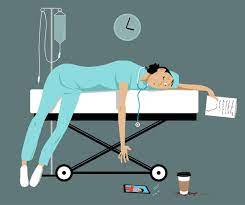 Refers to exhaustion of physical or emotional strength usually due to prolonged stress or frustration.
Refers to exhaustion of physical or emotional strength usually due to prolonged stress or frustration.
A work related syndrome involving emotional exhaustion, depersonalization, sense of reduced personal accomplishment.
Affects nearly 2/3 of physicians.
There is a high prevalence of professional burn out among physicians, nurses, physician assistants, nurse practitioners, and other members of the healthcare team.
Excessive fatigue is reported by 45% of physicians, and the suicide rate is 3-5 fold higher than in the general population.
A combination of emotional exhaustion, depersonalization, and low personal accomplishment caused by the chronic stress of medical practice.
Arises from a variety of stressors, has diminished professional satisfaction and it is predicted that substantial numbers of positions will reduce their work hours, entirely relinquish their practice, or switch careers.
Associated with reduced empathy, decreased feeling of personal accomplishment, and distancing from one’s work.
Results in medical errors, lower quality of care, higher costs, and worse medical outcomes.
Decreases quality of care through effects on patient safety and satisfaction, physician turnover, and reduced productivity.
It is a work related phenomenon driven primarily by work related stressors.
Physicians now spend less than 15% of their day in direct patient contact.
Physician burden is associated with poorly designed systems and ineffective regulatory policies, which are central to clinician frustration and time motion studies demonstrate that physicians now spending less than 15% of the day in direct patient contact.
Associated with increased physician turnover.
Associated with family and marital problems, emotional exhaustion, physical exhaustion, sleep disorders, increased rates of substance abuse, and increased risk of suicidal behavior.
Physicians experiencing burnout likely to engage in unethical behavior, cross boundaries, and having impaired communication skills with their patients.
Associated with increased medical errors, lower patient satisfaction, longer postdischarge recovery times, and decreased professional work effort.
Burn out among healthcare workers likely affects patient experience in all aspects of care, as well as outcomes of care and access to care.
Electronic medical record use strongly associated with dissatisfaction and physician burnout.
A recent study suggested that physicians spend only 24% of their time communicating with patients, but 44% of the time on their computer filling out electronic health records.
Associated with increased rates of prescribing, and medical errors
Highest rates associated with specialties at the front line of access to care-family medicine, general internal medicine, and emergency medicine.
Burnout among physicians varies by career stage, with the highest rate among mid-career physicians.
Burn out is associated with nurse turnover, absenteeism and poor performance with lower quality of care.
Burnout more common among physicians than among the general working population, a finding that persists after adjustment for age, gender, hours worked, and level of education.
Physician burnout, and fatigue is associated with major medical errors (Tawfik DS).
Burn out is driven by changes in health systems, reimbursement pressure, and increased demand for interaction with electronic systems, working longer hours and less joy in the practice of medicine.
Physicians now spend 1-2 hours on electronicmedical records and desk work for every one hour spent in the direct face-to-face contact with patients, as well as an additional 1-2 hours of personal time on electronic medical related activities daily outside of office hours.
The use of electronic medical records receives a grade of F by physician users, and there is a strong dose-response relationship between electronic medical record usability and the odds of burn out.
